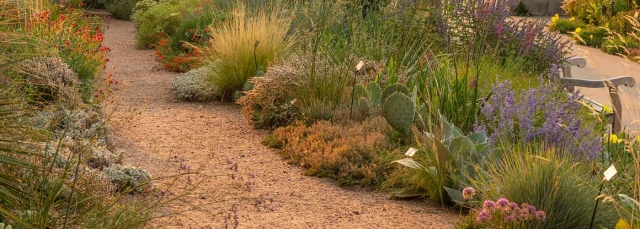In the face of drought and a changing climate, Denver Botanic Gardens is here to support water-wise gardening for all applications. Conserving water does not have to mean converting planted spaces to rocks or hardscapes. Whether you’re looking to replace turfgrass, grow vegetables or just beautify a small outdoor space with containers, the Gardens is your trusted resource for education on the right plant for the right place.
Education
Spring is the time to get educated on water-wise practices. The Gardens offers classes for beginners as well as seasoned gardeners.
The Gardens and Water Stewardship
Did you know that Denver Botanic Gardens’ commitment to water-wise horticulture and agriculture has a global reach? Learn more about water stewardship initiatives in our state and region or halfway around the world.
We also have residential water-wise tips, links to water-wise planting and plants, free seminars and many more resources. Here are free water-wise landscape designs and garden designs from some of our best regional landscape designers. These water-wise designs and xeriscapes are ideal for Colorado, Utah, Idaho and similar semi-arid states in the high plains and intermountain west.
Pollinators
Pollinators are vital to the creation of many plant-based foods, beverages, medicines and fabrics. The Gardens strives to provide habitats for and information about important pollinators such as birds, bees, butterflies and other insects, many of which thrive in environments with low-water-use plants.
Make your garden welcoming for pollinators year-round!
- Plant early and late season flowers to provide food when fewer plants are in bloom. Pulsatilla (Pasque flower), Phlox subulata (creeping phlox), Nepeta (catmint), Papaver (poppies) and Penstemon give early season sustenance. Late season food comes from Symphyotrichum (asters), Helenium (sneezeweed), Salvia and Solidago (goldenrod).
- Cut your garden back in spring.
- Native bees nest in dead limbs, branches and the hollows of the dried stems of flowering perennials. Leave some ground uncovered by weed barrier or mulch for ground-nesting bees.
- Provide essential water with bird baths, water features or simply a bowl out in the open.
- Reduce or eliminate your use of chemicals—even organic treatments can harm pollinators.
Helen Fowler Library
Not sure where to start with water-wise gardening? The Helen Fowler Library can help. Librarians are available to assist in locating materials for beginners and experts. Free admission to the library for members and the general public, no reservation required. Admission to the Gardens is separate.
- Library hours: Tuesday – Sunday, 10 a.m. – 2:30 p.m.
- First floor of the Freyer – Newman Center, 1085 York Street
Gardens’ members may check out library materials.
Gardening Help
Colorado Master Gardeners from CSU Extension Denver County work in partnership with the Gardens to provide research-based answers to gardening and plant-related questions with Gardening Help. Colorado Master Gardeners are on-site in the Gardening Help office in the Helen Fowler Library January through October.
- April – Oct.: Tuesdays, Thursdays & Saturdays, 10 a.m. – 2 p.m.
- Nov. – Dec.: Email only – gardeninghelp@botanicgardens.org
- Jan. – March: Tuesdays, 10 a.m. – 2 p.m.
You can also reach Gardening Help at 720-865-3575 or by email at gardeninghelp@botanicgardens.org.
Colorado Turf Replacement Program
In June 2022, Colorado passed legislation creating a turf replacement incentive program to spur the conversion of some nonessential lawns in urban and residential areas to drought-tolerant landscapes. The goal of this program is to reduce landscape water use by reducing the amount of non-functional/ornamental turf grass by approximately 30 percent throughout the state while enhancing and maintaining urban landscapes and tree canopies that are beneficial to the environment, wildlife and our communities. The Gardens’ York Street location has recently converted or is planning to convert several turf areas to more water-wise plantings to showcase best practices and to guide visitors in making their own transitions.
Recommended Websites
- Gardens Navigator — Locate and learn about thousands of plants from Denver Botanic Gardens' collections, learn more about the Gardens and its exhibitions, and create a personalized tour.
- Recommendations from the Helen Fowler Library — Specially selected websites providing information on a wide range of gardening, botanical and horticultural topics. Includes links to plant society websites.
- Plant Select® — Plant names, color photos, growing tips and basic information for gardens from the high plains to the intermountain region.
- Planttalk® Colorado — Timely and reliable essays on all aspects of horticulture and gardening in Colorado. Find Xeriscape practices here.
- Plant Something Colorado — Inspiration and information from pros who know what it takes to grow a beautiful, bountiful landscape in Colorado
